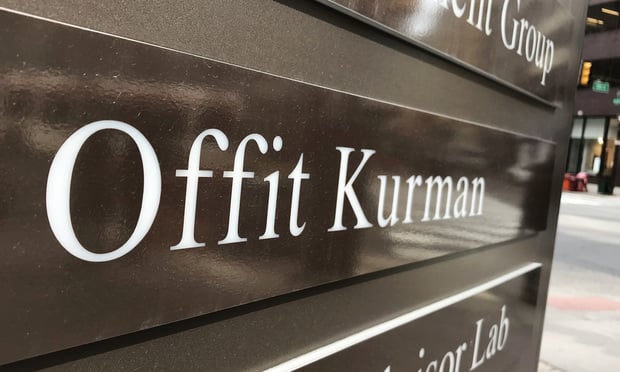Houston Retailer Alleges Offit Kurman Overbilled for Defense Work, E-Discovery
A Houston retailer and its owner allege a partner at the Maryland-based firm mishandled litigation and withdrew from representation at a time that "forced" them to settle related litigation for $450,000.
May 13, 2020 at 04:18 PM
4 minute read
The original version of this story was published on Texas Lawyer
 Offit Kurman offices in downtown Philadelphia. April 9, 2018. (Photo: Diego M. Radzinschi/ALM)
Offit Kurman offices in downtown Philadelphia. April 9, 2018. (Photo: Diego M. Radzinschi/ALM)
A Texas lawsuit alleging "unconscionable conduct," including overbilling and negligence by a Philadelphia partner of Maryland-based Offit Kurman, is now in federal court in Houston, where the plaintiffs are seeking more than $1 million in damages.
Houston online retailer LuxeYard and its owner Amir Mireskandari alleged in their petition, originally filed in state district court in Houston on April 13, that Offit Kurman and partner Frank Noyes not only overbilled them for work while defending them in underlying litigation, but mishandled the litigation, which resulted in them having to pay $450,000 in settlements in other lawsuits.
"[T]his lawsuit is brought to disgorge all fees paid to defendants and recover the damages caused by defendants' gross incompetence in the name of morality and justice," LuxeYard alleged in the petition.
The suit alleged overbilling, block billing and duplicative billing, as well as fee churning.
Offit Kurman, which has grown its head count dramatically in recent years, now has well over 200 lawyers throughout its 13 offices along the East Coast.
It's far from the first large firm to be hit with allegations of overbilling. In Texas last year, Morrison & Foerster settled a lawsuit filed in state court by a group of former clients who alleged the firm engaged in "egregious overbilling." Last December, a Boston-based partner at Duane Morris was suspended for six months from the Massachusetts bar for inflating her billable hours when she was a partner at Saul Ewing Arnstein & Lehr.
The defendants filed an answer Monday denying the allegations. On Tuesday, the case was removed to the U.S. District Court for the Southern District of Texas.
LuxeYard will file a motion to remove the suit back to state court in Houston, said plaintiffs attorney Lance Kassab of Kassab Law Firm in Houston.
As alleged in the petition, LuxeYard hired Noyes in February 2019 to defend the company and its owner in two lawsuits that had been filed in Delaware. They paid Offit Kurman a retainer of $8,000.
The suit alleged that Noyes "pressured" Luxeyard to hire a specific electronic discovery company and the service would only cost the plaintiffs $4,000. However, the service billed the plaintiffs a "huge sum of money over the next several months" and Noyes and his team "spent the next few months engaging in meaningless and irrelevant tasks," and billed "excessively" for associates to research basic legal theory.
"Noyes and at least one other associate repeatedly and concurrently researched the same or similar issues of law, double-billing plaintiffs on several days, and sometimes on the same day," and also held several in-office meetings with all personnel that generated "tens of thousands of dollars in legal fees."
The plaintiffs also alleged that Noyes "never filed any dispositive motions on behalf of the defendants," failed to meet deadlines, and on more than one occasion almost inadvertently produced Mireskandari's personal financial documents.
In September 2019, Noyes filed a motion to withdraw as counsel, "citing plaintiffs refusal to pay their outstanding invoices," a development that Mireskandari and his company alleged "forced" them to settle two related lawsuits for $450,000.
Additionally, the petition alleged that a large percentage of the defendants' billing—a total of $79,353—was so-called block billing, which involves recording multiple tasks as a single billing entry.
"Defendants' gross incompetence, inefficient billing practices and fee churning resulted in plaintiffs being forced to settle two connected cases in the amount of $450,000, and pay $45,000 in legal fees and expenses to defendants and for which they should not have been responsible," the petition alleged.
The plaintiffs alleged the defendants engaged in "churning literally more than $120,000″ in attorney fees.
Mireskandari and Luxeyard brought negligence, breach of duty of fair dealing, breach of fiduciary duty and fraud by nondisclosure causes of action and they are seeking damages under the Texas Deceptive Trade Practice Act.
Noyes did not immediately return a telephone message seeking comment. A spokesperson for Offil Kurman did not respond to an email seeking comment.
Read More
MoFo Settles Texas Suit Over Billing Practices
Duane Morris Partner Suspended 6 Months for Overbilling at Former Firm, Saul Ewing
Offit Kurman Takes on 27-Lawyer Group in Charlotte, Planting Flag in Southeast
This content has been archived. It is available through our partners, LexisNexis® and Bloomberg Law.
To view this content, please continue to their sites.
Not a Lexis Subscriber?
Subscribe Now
Not a Bloomberg Law Subscriber?
Subscribe Now
NOT FOR REPRINT
© 2025 ALM Global, LLC, All Rights Reserved. Request academic re-use from www.copyright.com. All other uses, submit a request to [email protected]. For more information visit Asset & Logo Licensing.
You Might Like
View All
Law Firms Look to Gen Z for AI Skills, as 'Data Becomes the Oil of Legal'

Law Firms Expand Scope of Immigration Expertise Amid Blitz of Trump Orders
6 minute read
Latest Boutique Combination in Florida Continues Am Law 200 Merger Activity
3 minute read
Incoming Howard University Law Professor Kiah Duggins Among DC Plane Crash Victims
Law Firms Mentioned
Trending Stories
- 1Uber Files RICO Suit Against Plaintiff-Side Firms Alleging Fraudulent Injury Claims
- 2The Law Firm Disrupted: Scrutinizing the Elephant More Than the Mouse
- 3Inherent Diminished Value Damages Unavailable to 3rd-Party Claimants, Court Says
- 4Pa. Defense Firm Sued by Client Over Ex-Eagles Player's $43.5M Med Mal Win
- 5Losses Mount at Morris Manning, but Departing Ex-Chair Stays Bullish About His Old Firm's Future
Who Got The Work
J. Brugh Lower of Gibbons has entered an appearance for industrial equipment supplier Devco Corporation in a pending trademark infringement lawsuit. The suit, accusing the defendant of selling knock-off Graco products, was filed Dec. 18 in New Jersey District Court by Rivkin Radler on behalf of Graco Inc. and Graco Minnesota. The case, assigned to U.S. District Judge Zahid N. Quraishi, is 3:24-cv-11294, Graco Inc. et al v. Devco Corporation.
Who Got The Work
Rebecca Maller-Stein and Kent A. Yalowitz of Arnold & Porter Kaye Scholer have entered their appearances for Hanaco Venture Capital and its executives, Lior Prosor and David Frankel, in a pending securities lawsuit. The action, filed on Dec. 24 in New York Southern District Court by Zell, Aron & Co. on behalf of Goldeneye Advisors, accuses the defendants of negligently and fraudulently managing the plaintiff's $1 million investment. The case, assigned to U.S. District Judge Vernon S. Broderick, is 1:24-cv-09918, Goldeneye Advisors, LLC v. Hanaco Venture Capital, Ltd. et al.
Who Got The Work
Attorneys from A&O Shearman has stepped in as defense counsel for Toronto-Dominion Bank and other defendants in a pending securities class action. The suit, filed Dec. 11 in New York Southern District Court by Bleichmar Fonti & Auld, accuses the defendants of concealing the bank's 'pervasive' deficiencies in regards to its compliance with the Bank Secrecy Act and the quality of its anti-money laundering controls. The case, assigned to U.S. District Judge Arun Subramanian, is 1:24-cv-09445, Gonzalez v. The Toronto-Dominion Bank et al.
Who Got The Work
Crown Castle International, a Pennsylvania company providing shared communications infrastructure, has turned to Luke D. Wolf of Gordon Rees Scully Mansukhani to fend off a pending breach-of-contract lawsuit. The court action, filed Nov. 25 in Michigan Eastern District Court by Hooper Hathaway PC on behalf of The Town Residences LLC, accuses Crown Castle of failing to transfer approximately $30,000 in utility payments from T-Mobile in breach of a roof-top lease and assignment agreement. The case, assigned to U.S. District Judge Susan K. Declercq, is 2:24-cv-13131, The Town Residences LLC v. T-Mobile US, Inc. et al.
Who Got The Work
Wilfred P. Coronato and Daniel M. Schwartz of McCarter & English have stepped in as defense counsel to Electrolux Home Products Inc. in a pending product liability lawsuit. The court action, filed Nov. 26 in New York Eastern District Court by Poulos Lopiccolo PC and Nagel Rice LLP on behalf of David Stern, alleges that the defendant's refrigerators’ drawers and shelving repeatedly break and fall apart within months after purchase. The case, assigned to U.S. District Judge Joan M. Azrack, is 2:24-cv-08204, Stern v. Electrolux Home Products, Inc.
Featured Firms
Law Offices of Gary Martin Hays & Associates, P.C.
(470) 294-1674
Law Offices of Mark E. Salomone
(857) 444-6468
Smith & Hassler
(713) 739-1250








